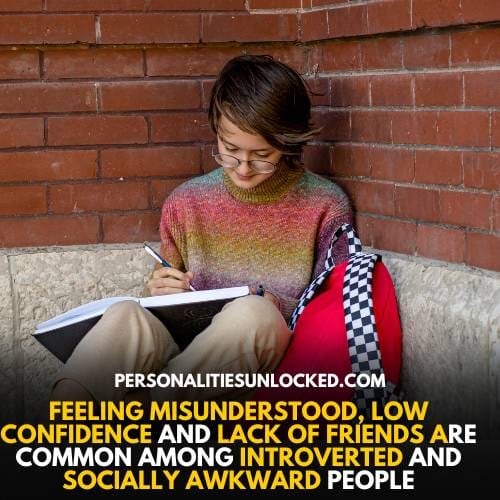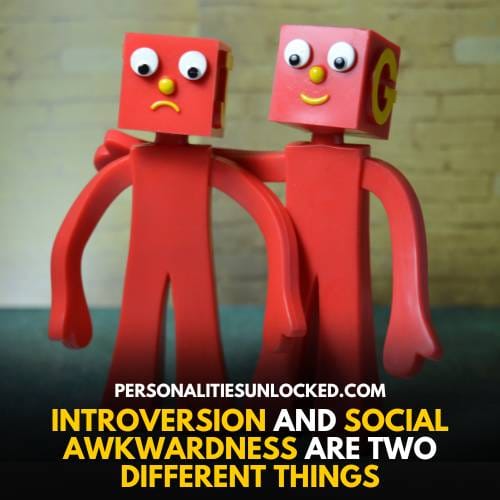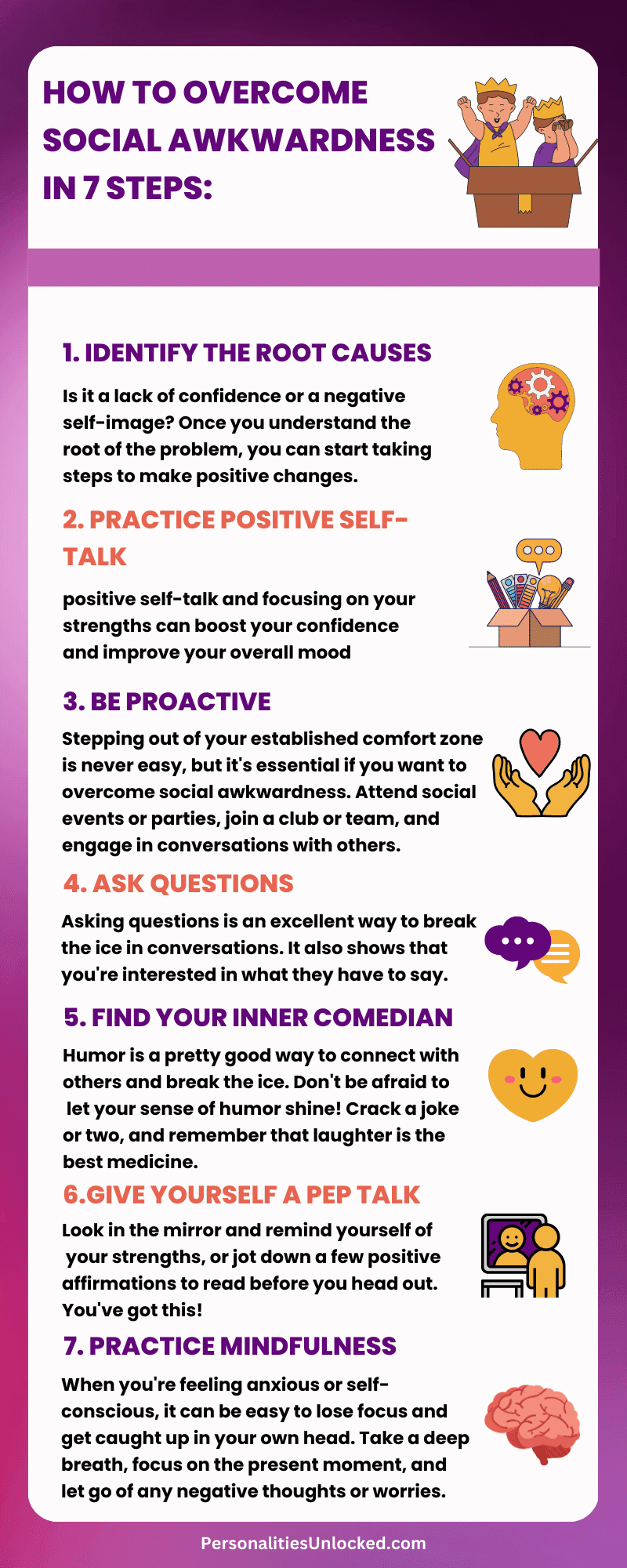Table of Contents
Do you ever wonder if your quietness is mistaken for social awkwardness? If you’re constantly trying to evaluate whether you’re introverted or socially awkward, then you’ve come to the right place!
In this article, we’ll explore the differences between being quiet and being socially awkward while giving you tips and tricks to help you overcome any social awkwardness. So, be sure to stick around as we answer the age-old question: Am I socially awkward or just quiet?
What is Social Awkwardness?
Social awkwardness is when your brain and mouth decide to go on a little break, leaving you stranded in awkward silence or with a poorly-timed joke that falls flat. It’s like trying to play a game of charades, but you’re the only one who doesn’t know the answer.
🖼️ Picture this: you’re at a party, feeling confident and ready to mingle. You approach a group of people and try to join in on their conversation. But instead of smoothly inserting yourself into the discussion, you end up saying something completely irrelevant or accidentally interrupting someone. Oops.
Or maybe you’re on a first date and trying your best to make a good impression. You start talking about your hobbies and interests, but suddenly you realize you’re going on and on about your stamp collection or love of knitting. Your date’s eyes start to glaze over, and you can feel yourself turning red.
Social awkwardness can strike at any time, and it can be triggered by anything from meeting new people to simply walking into a room. But fear not, my friend! You’re not alone. In fact, some of the most brilliant minds in history were known for their social awkwardness. So embrace your quirks, and don’t be afraid to laugh at yourself when you do something cringe-worthy—after all, life’s too short of taking ourselves too seriously.

What Causes Social Awkwardness?
Social awkwardness is like accidentally spilling your drink on someone, but instead of a one-time embarrassment, it can happen repeatedly. It’s a common experience that can leave you feeling like you’re auditioning for a cringe comedy, but fear not! You’re not alone. Let’s explore some possible causes of social awkwardness and see if we can help you overcome them.
- First, we have the classic trigger: low self-esteem. Social situations can be like walking on eggshells when you don’t feel great about yourself. You may worry about being judged or not fitting in, which can lead to even more awkwardness. It’s like being in a constant state of stage fright, but without applause.
- Another potential cause is poor social skills. If you’re not great at reading social cues or making conversation, it can be tough to feel comfortable in social situations. It’s like trying to play a game of telephone, but you keep getting the message wrong.
- But what about unfamiliar settings? Stepping outside your comfort zone can be terrifying, whether at a party with strangers or starting a new job. It’s like being in a foreign country where you don’t speak the language. Everything seems confusing and overwhelming.
- And let’s not forget about social media. It’s supposed to bring us all closer together, but sometimes it can make us feel even more awkward. We can obsess over how many likes we get, worry about saying the wrong thing, or feel like we’re not really living up to the picture-perfect lives we see online.
There are plenty of other causes of social awkwardness, but the important thing is to remember that it’s okay to feel this way. We’re all a little weird and awkward in our own ways, which makes us human. So take a deep breath, embrace your quirks, and know you’re not alone.

Am I socially awkward or just quiet?
Here are 7 differences between being quiet and being socially awkward:
| Quiet | Socially Awkward |
| Prefers to listen more than talk | Struggles with finding things to say |
| Enjoys alone time | Feels anxious or uncomfortable in social situations |
| Is okay with silence | Feels like they don’t fit in with others |
| Can be mistaken for being shy | Worries about being judged by others |
| Doesn’t feel the need to impress others | Feels like they’re always saying or doing the wrong thing |
| May have a small group of close friends | Has difficulty making new friends |
| May be introverted but not necessarily socially anxious | May be extroverted but still struggle with social interactions |
Of course, these differences aren’t set in stone, and there’s a lot of overlap between being quiet and being socially awkward. But hopefully, this table can help you identify some of the key differences and better understand where you fall on the spectrum.
However, There Are Some Commonalities Among Quiet and Socially Awkward People Too:
While there are certainly differences between being quiet and being socially awkward, they also have some things in common. Here are a few examples:
- Both may feel misunderstood. Whether you’re quiet or socially awkward, it can be frustrating when others don’t understand or appreciate your perspective. You may feel like people are judging you or assuming things about you that aren’t true.
- Both may struggle with confidence. You may worry that others see you as boring or uninteresting if you’re quiet. If you’re socially awkward, you may feel like you’re always putting your foot in your mouth or making a fool of yourself. Either way, it can be tough to feel confident in social situations.
- Both may benefit from the practice. Whether you’re trying to be more outgoing or just more comfortable in your own skin, practice can be helpful. For example, if you’re quiet, you may try practicing small talk with strangers. If you’re socially awkward, you may practice social skills like active listening or eye contact.
- Both may feel like they’re missing out. When you’re quiet or socially awkward, it can be easy to feel like you’re missing out on social experiences. You may envy those who seem to make friends and enjoy social situations effortlessly.
- Both may have a lot to offer. Just because you’re quiet or socially awkward doesn’t mean you don’t have a lot to offer the world. You may be a great listener, a creative thinker, or a loyal friend. So don’t underestimate your strengths; remember that everyone has something unique to contribute.

Are introverts socially awkward?
No, they’re not; introversion and social awkwardness are two different things. As an introvert myself, I’m here to reassure you that being an introvert does not necessarily equate to being socially awkward. Let’s put things into more perspective:
- From a philosophical perspective, introverts tend to be more introspective and thoughtful and often value meaningful connections over superficial interactions. This preference for depth over breadth may result in fewer social interactions, but it doesn’t necessarily mean that introverts are socially inept. In fact, many introverts are skilled communicators who are adept at listening and empathizing with others.
- From a psychological perspective, introverts tend to be more sensitive to stimulation and may become overstimulated in social situations that are too busy or noisy. This sensitivity can make socializing more challenging, but it doesn’t mean that introverts are inherently awkward. Instead, it may simply be a matter of finding the right social environment where they feel comfortable and can thrive.
- From a social perspective, introverts may face some challenges in a world that often values extroverted qualities, such as outgoingness (if that’s a word) and assertiveness. However, introverts bring their own unique strengths to the table, such as thoughtfulness, creativity, and a deep sense of empathy. By embracing their introverted nature and finding ways to connect with others in an authentic way, introverts can develop fulfilling and meaningful relationships.
So, fellow introverts, don’t let anyone tell you that you’re socially awkward just because you prefer a quiet night to a crowded party. Embrace your introversion and focus on cultivating the kinds of connections that feel meaningful and fulfilling to you. And remember, sometimes the most profound connections are the ones that happen in quiet moments of reflection and contemplation.

What To Do If I Am Just Quiet or Introverted?
If you’re just quiet or an introvert, you don’t have to change unless it affects your life and the people around you. For that, try to come out of your shell; the best way to do that is to just talk to people.
Now I know, what do I talk about? That’s what you’re wondering. The simple answer; ask questions and listen to them talking, give a few responses in between, and let them lead the conversation.
For instance, if you’re talking about MMA and you’re not very fond of it, just ask about their favorite player, then you can give counter questions such as why they like that player, who should be a good competitor to that player, and so on.
I know it’s hard, and at the start, you won’t have very much to add, but if you keep practicing this, I promise you, soon you’ll have responses start popping up in your head on autopilot (I’ve tried and tested this on myself).
How to Overcome Social Awkwardness in 7 Steps:
Are you tired of feeling socially awkward and missing out on social opportunities? Don’t worry; you’re not alone! Here are some super helpful tips for you to overcome your social awkwardness and start living your best life.
Step 1: Identify the Root Causes
First things first, it’s important to identify what’s causing your social awkwardness. Is it a lack of confidence or a negative self-image? Once you understand the root of the problem, you can start taking steps to make positive changes.
Step 2: Practice Positive Self-Talk
Don’t let negative self-talk bring you down! It may feel uncomfortable at first, but positive self-talk can help boost your confidence and improve your overall mood. Practice telling yourself that you’re amazing, and focus on your strengths. 
Step 3: Be Proactive
Stepping out of your established comfort zone is never easy, but it’s essential if you want to overcome social awkwardness. Attend social events or parties, join a club or team, and engage in conversations with others. The more you try to put yourself out there, the easier it will become.
Step 4: Ask Questions
Asking questions is an excellent way to break the ice in conversations and learn more about the people you’re talking to. It also shows that you’re interested in what they have to say, which can help make them feel more comfortable around you.
Step 5: Find Your Inner Comedian
Humor is a pretty good way to connect with others and break the ice. Don’t be afraid to let your sense of humor shine! Crack a joke or two, and remember that laughter is the best medicine.
Step 6: Embrace Your Quirks
We all have quirks and idiosyncrasies that make us unique, so embrace them! Instead of trying to fit into a mold or hide your quirks, let them shine through. People will appreciate your authenticity, and you’ll feel more confident in your own skin.
Step 7: Give Yourself a Pep Talk
Sometimes, you only need a little encouragement to feel more confident in social situations. So give yourself a pep talk! Look in the mirror and remind yourself of your strengths, or jot down a few positive affirmations to read before you head out. You’ve got this!
Step 8: Practice Mindfulness
When you’re feeling anxious or self-conscious, it can be easy to lose focus and get caught up in your own head. To combat this, practice mindfulness. Take a deep breath, focus on the present moment, and let go of any negative thoughts or worries. By being more present and focused, you’ll be better able to connect with others and enjoy the moment.
Remember, feeling a little nervous or uncomfortable in social situations is okay. Just focus on conversing as if you were talking to an old friend. And don’t forget to fake confidence – smile and make eye contact, even if you’re feeling a little uneasy.
Parting Words:
If you’re not sure whether you’re socially awkward or just plain shy, try asking for help. Ask your friends, family, or even strangers for their opinion. You can even create a ‘social experiment’ and see how comfortable you feel in different situations.
And lastly, don’t forget to practice, practice, practice! Set up hangouts with friends or even practice conversations with yourself. You’ll be a pro in no time.
At the end of the day, we’re all different, and that’s okay! So take a deep breath, relax, and remember that you’re an awesome human being just the way you are. With some effort and practice, you can beat your social awkwardness and start living your best life!